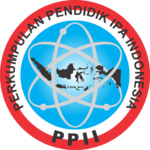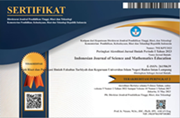The relationship between learning environment and learning motivation to natural and social sciences learning outcomes of the fourth-grade elementary school students
Abstract
Keywords
Full Text:
PDFReferences
A. O. Safitri, V. D. Yunianti, and D. Rostika, “Upaya Peningkatan pendidikan berkualitas di Indonesia: Analisis pencapaian sustainable development goals (SDGs),” J. Basicedu, vol. 6, no. 4, pp. 7096–7106, 2022, doi: 10.31004/basicedu.v6i4.3296.
T. Simamora, E. Harapan, and N. Kesumawati, “Faktor-faktor determinan yang mempengaruhi prestasi belajar siswa,” JMKSP (Jurnal Manajemen, Kepemimpinan, Dan Supervisi Pendidikan), vol. 5, no. 2, pp. 191–205, 2020.
A. Aisyah, R. Jaenudin, and D. Koryati, “Analisis faktor penyebab rendahnya hasil belajar peserta didik pada mata pelajaran ekonomi di SMA Negeri 15 Palembang,” J. profit Kaji. Pendidik. Ekon. dan ilmu Ekon., vol. 4, no. 1, pp. 1–11, 2018.
A. Fitrayanti, S. Hajaroh, and A. Mizriaty, “Identifikasi kesulitan belajar siswa kelas ix pada materi partikel penyusun benda dan makhluk hidup di MTs. Al-Fathiyah,” SPIN J. Kim. Pendidik. Kim., vol. 3, no. 2, pp. 200–209, 2021.
P. Sahertian, “Lingkungan keluarga, lingkungan sosial dan pergaulan teman sebaya terhadap hasil belajar,” J. Penelit. dan Pendidik. IPS, vol. 14, no. 1, pp. 7–14, 2020.
L. Al Khumaero and S. Arief, “Pengaruh gaya mengajar guru, disiplin belajar, dan teman sebaya terhadap prestasi belajar,” Econ. Educ. Anal. J., vol. 6, no. 3, pp. 698–710, 2017.
I. Prijayanti, “Pengaruh self efficacy terhadap motivasi belajar siswa kelas V di SD Negeri 5 Kota Bengkulu,” B.S. thesis, Deprt. Madrasah Ibtidaiyah Teacher Education, Faculty of Tarbiyah and Tadris, UIN Fatmawati Sukarno Bengkulu, 2023. [Online]. Available : http://repository.uinfasbengkulu.ac.id/2018/.
D. E. O. Marselus, “Analisis motivasi belajar siswa pada pembelajaran bola voli dI SMP Negeri 5 Mukok Kabupaten Sanggau,” B.S. thesis, Deprt. Physical Education, Faculty of Sports and Health Education, IKIP PGRI Pontianak, 2023. [Online]. Available : https://digilib.ikippgriptk.ac.id/id/eprint/1366/.
N. I. M. Shafi’atun Nur Khasanah, “Pengaruh motivasi belajar intrinsik terhadap prestasi belajar siswa kelas V di MI Ma’arif NU 1 Kracak Kecamatan Ajibarang Kabupaten Banyumas,” B.S. thesis, Deprt. Madrasah Ibtidaiyah Teacher Education, Faculty of Tarbiyah and Tadris, IAIN Purwokerto, 2018. [Online]. Available : https://repository.uinsaizu.ac.id/4494/2.
A. A. Hsb, “Kontribusi lingkungan belajar dan proses pembelajaran terhadap prestasi belajar siswa di sekolah,” Jurnal Tarbiyah, vol. 25, no. 2, pp. 1-20, 2018.
I. Dayana and J. Marbun, Motivasi kehidupan. Guepedia : Jawa Barat, 2018.
S. Lutfiwati, “Motivasi belajar dan prestasi akademik,” Al-Idarah J. Kependidikan Islam, vol. 10, no. 1, pp. 53–63, 2020.
A. A. Ole and E. G. Dipan, “Hubungan kondisi lingkungan belajar di sekolah dan hasil belajar siswa,” J. Inov. Pembelajaran Mat. PowerMathEdu, vol. 2, no. 1, pp. 71–78, 2023.
S. Munalisa, I. Fathurrohman, and S. Siswanto, “Implementasi manajemen kelas dalam meningkatkan prestasi siswa kelas IX di SMPN 13 Rejang Lebong,” B.S. thesis, Deprt. Islamic Education Management, Faculty of Tarbiyah and Tadris, IAIN Curup, 2022. [Online]. Available : https://e-theses.iaincurup.ac.id/3258/1.
M. Oktasari, S. Solihatun, and M. Monalisa, “Kontribusi dukungan sosial teman sebaya terhadap motivasi berprestasi siswa,” Biblio Couns J. Kaji. Konseling dan Pendidik., vol. 1, no. 1, pp. 22–28, 2018.
S. T. Hidayati, “Hubungan dukungan sosial teman sebaya dengan motivasi belajar siswa kelas VII MTS Al-Yasini Pasuruan.” B.S. thesis, Deprt. Phychology, Faculty of Psychology, Universitas Islam Negeri Maulana Malik Ibrahim, 2016. [Online]. Available : http://etheses.uin-malang.ac.id/5199/1/12410065.
S. Suhelayanti, S. Syamsiah, I. Rahmawati, Y.R.P. Tantu, W.R. Kunusa, N. Suleman, H. Nasbey, J.S. Tangio, and D. Anzela, Pembelajaran Ilmu Pengetahuan Alam dan Sosial (NATURAL AND SOCIAL SCIENCES). Yayasan Kita Menulis : Jakarta Barat, 2023.
A. Hartoyo and D. Rahmadayanti, “Potret kurikulum merdeka, wujud merdeka belajar di Sekolah Dasar,” J. Basicedu, vol. 5, no. 4, pp. 2247–2255, 2022.
O. A. Harso and A. Y. Seku, “Pengaruh lingkungan belajar terhadap hasil belajar ipa siswa smpk inemete nangapanda,” J. Inov. Penelit., vol. 3, no. 9, pp. 7589–7594, 2023.
M. Mahdalena, “Pengaruh minat belajar, dukungan orang tua dan lingkungan belajar terhadap perilaku belajar siswa dan hasil belajar siswa pada mata pelajaran IPA (Studi faktor yang mempengaruhi prilaku belajar dan hasil belajar siswa kelas 4, 5 dan 6 pada SDN Binuang 4 dan SDN Binuang 8 di Kecamatan Binuang Kabupaten Tapin dalam Pelajaran IPA),” KINDAI, vol. 18, no. 2, pp. 332–351, 2022.
M. Rosit, “Pengaruh status sosial ekonomi orang tua, motivasi belajar dan lingkungan belajar terhadap hasil belajar mata pelajaran IPS siswa MTs Raden Fatah tahun pelajaran 2019/2020,” J. Penelit. Dan Pendidik. IPS, vol. 15, no. 1, pp. 33–37, 2021.
A. Riadin, “Pengaruh motivasi belajar dan minat belajar terhadap hasil belajar ipa peserta didik pada era merdeka belajar,” Holistika J. Ilm. PGSD, vol. 6, no. 2, pp. 108–114, 2022.
P. D. W. G. Yuniahans, R. Parlika, R. S. Arhinza, V. F. Mahjid, M. G. Alfian “Uji validitas aplikasi si-book menggunakan SPSS dengan kombinasi metode r-tabel dan cohen’s kappa,” Jurnal Teknologi Informasi, vol. 16, no. 2, pp. 121-133, 2022, doi : 10.47111/jti.v16i2.5001.
C. Chandra and K. Khiong, “Minat Belajar dan Lingkungan Belajar Dalam Meningkatkan Proses Belajar Aktif Pendidikan Agama Buddha,” J. Educ. FKIP UNMA, vol. 10, no. 1, pp. 201–206, 2024.
H. Azma, “Pengaruh fasilitas belajar, minat belajar, lingkungan belajar dan motivasi belajar terhadap hasil belajar siswa pada mata pelajaran IPS SMK Kabupaten Tanah Datar: Kajian,” J. Ilm. Univ. Batanghari Jambi, vol. 19, no. 2, pp. 387–390, 2019.
R. H. Khotimah, C. L. Radjah, and D. M. Handarini, “Hubungan antara konsep diri akademik, efikasi diri akademik, harga diri dan prokrastinasi akademik pada siswa SMP negeri di kota malang,” J. Kaji. Bimbing. dan konseling, vol. 1, no. 2, pp. 60-67, 2024, doi : 10.17977/um001v1i22016p060.
T. Takdir, S. Sudiyono, and D. F. Putra, “Kontribusi lingkungan belajar dan motivasi belajar terhadap hasil belajar IPS siswa Sekolah Dasar,” Efektor, vol. 10, no. 1, pp. 88–100, 2023.
A. Sholihah and R. Y. Kurniawan, “Analisis pengaruh motivasi belajar dan lingkungan belajar terhadap hasil belajar,” J. Pendidik. Ekon., vol. 4, no. 3, pp.1-5, 2016, doi : 10.26740/jupe.v4n3.p%25p.
N. Nurdyansyah and E. F. Fahyuni, Inovasi Model Pembelajaran Sesuai Kurikulum 2013. Nizamia Learning Center : Sidoarjo, 2016.
N. M. D. C. Bawanti, I. M. Tegeh, and I. W. Suwatra, “Hubungan sarana pembelajaran dan motivasi belajar dengan hasil belajar IPS,” Int. J. Elem. Educ., vol. 3, no. 3, pp. 335–343, 2019, doi : 10.23887/ijee.v3i3.19449.
N. Ali, “The influence of learning environment to students’ non-cognitive outcomes: Looking through the PISA lens,” Eurasia J. Math. Sci. Technol. Educ., vol. 19, no. 3, pp. 1-16, 2023, doi: 10.29333/ejmste/12967.
DOI: http://dx.doi.org/10.24042/ijsme.v7i2.22568
Refbacks
- There are currently no refbacks.
Copyright (c) 2024 Unit Riset dan Publikasi Ilmiah FTK UIN Raden Intan Lampung

This work is licensed under a Creative Commons Attribution-ShareAlike 4.0 International License.

Indonesian Journal of Science and Mathematics Education is licensed under a Creative Commons Attribution-ShareAlike 4.0 International License.




